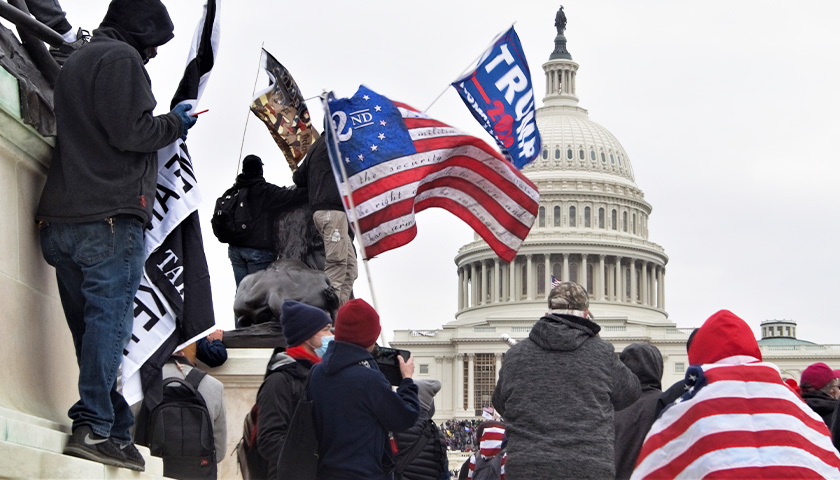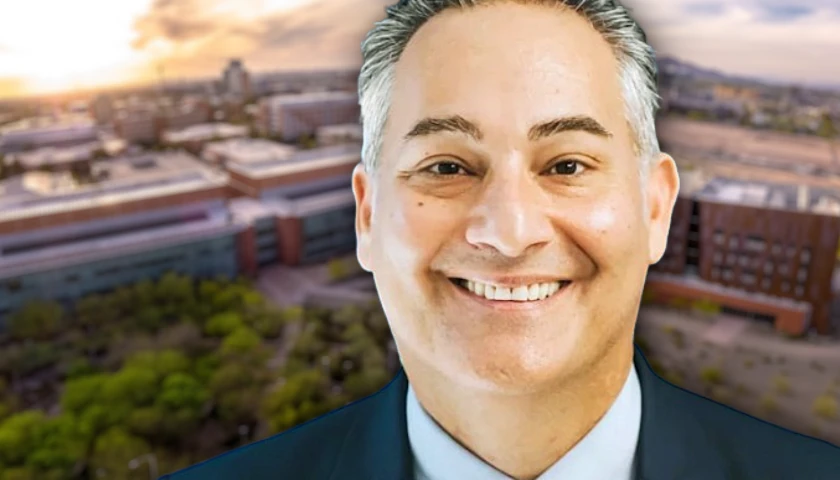by Julie Kelly
Of the hundreds of video clips used as evidence in the marathon trial of five members of the Proud Boys, prosecutors began closing arguments not with a clip of the defendants engaged in criminal activity but with a clip of Donald Trump.
The government showed the jury a portion of the September 2020 presidential debate; goaded by Joe Biden and then-Fox News host Chris Wallace to condemn “white supremacists and militia groups” in an effort to downplay Black Lives Matter and Antifa violence, Trump asked them to “give me a name.” Biden quickly answered, “the Proud Boys.”
“Proud Boys, stand back and stand by,” Trump said in response.
The offhand remark—Trump later said he did not know who the Proud Boys were—made the group “jubilant,” assistant U.S. Attorney Conor Mulroe told the jury on Monday morning. “These defendants saw themselves as Donald Trump’s army, fighting to keep their preferred leader in power no matter what,” Mulroe said, referring to Ethan Nordean, Joseph Biggs, Enrique Tarrio, Dominic Pezzola, and Zachary Rehl.
Prosecutors have used the clip at other points during the nearly four-month trial—a not-so-subtle reminder to jurors from a city that voted 93 percent for Joe Biden that the men on trial supported Trump. But the Justice Department may have a more sisnter reason to tie the Proud Boys to the former president. Any convictions in this trial would give Special Counsel Jack Smith, an independent prosecutor in name only, justification to pursue similar charges against Trump as a coconspirator of sorts.
In fact, the Proud Boys face three conspiracy counts: seditious conspiracy, conspiracy to obstruct an official proceeding, and a conspiracy to prevent an officer from discharging any duties. A conspiracy, according to the government, only requires the agreement of two or more individuals.
Prosecutors insist the conspiracy began on December 19, 2020—a date that should alarm Team Trump. At 1:42 a.m. on December 19, Trump tweeted this: “Statistically impossible to have lost the 2020 Election. Big protest in D.C. on January 6th. Be there, will be wild!” According to the Justice Department, that prompted Tarrio and Biggs to formulate plans to “radicalize” the group.
The next day, Tarrio created an encrypted chat to discuss, among other things, plans to travel to D.C. for Trump’s speech on January 6. (The government obtained roughly 500,000 messages between dozens of accounts, including an unknown number posted by FBI informants.) As I explained in my Wednesday column, discussions resulted not in an armed, violent attempt to overthrow the government but a haphazard plan with no cohesive execution. (Some stopped at food trucks on the walk from the rallying point at the Washington Monument to Capitol grounds, like all good insurrectionists on a coordinated and deliberate mission do.) Tarrio, the group’s leader, wasn’t even in D.C. that day.
But reality and evidence don’t count for much before juries in the nation’s capital as the Justice Department—U.S. Attorney for the District of Columbia Matthew Graves, a Biden appointee who attended the government’s closing argument on Monday morning, more specifically—racks up a near-perfect conviction rate in January 6 jury trials.
To be fair, Graves’ office isn’t alone in blaming Trump for instigating the Proud Boys’ actions before and on January 6. At least two defense attorneys also pointed the finger at Trump. “[A] nation of strangers gathered as the commander-in-chief sold a lie,” Norm Pattis, representing Biggs, said of Trump’s election claims. “It was a perfect storm. Come to January 6, gonna be wild, the commander-in-chief said.”
Pattis and Tarrio’s attorney, Nayib Hassan, cited Trump’s comment to “fight like hell” during his speech at the Ellipse as proof of Trump’s culpability in the events of January 6. That quote would be “exhibit one,” Pattis said, in any criminal trial against the former president.
The January 6 select committee made the Proud Boys a target of its work; the group is mentioned more than 90 times in the panel’s final report. “In the two and a half weeks since he first announced the January 6th ‘protest,’ extremists and conspiracy theorists plotted to make the unprecedented, presidentially announced protest against the peaceful transfer of power ‘wild’ indeed,” the committee wrote. “That mob showed up. They were armed. They were angry. And when Donald Trump pointed them toward the Capitol and told them to ‘fight like hell,’ that’s exactly what they did.”
Committee members voted unanimously in December 2022 to send criminal referrals to Smith’s office related to Trump’s conduct before and on January 6: obstruction of an official proceeding, conspiracy to defraud the United States, conspiracy to make a false statement, and “incite,” “assist” or “aid and comfort” an insurrection.
But the committee also suggested Smith could pursue seditious conspiracy charges against the former president. “A jury has already determined beyond a reasonable doubt that a conspiracy existed under [seditious conspiracy statute], as the leader of the Oath Keepers and at least one other individual were convicted of seditious conspiracy for their actions related to the attack on the Capitol,” the committee wrote. “A trial regarding a series of other ‘Proud Boy’ defendants may also address similar issues.”
Which explains why Graves’ prosecutors pulled every dirty trick in the book to ensure convictions. Further, the burden of proof for the conspiracy charges is shockingly low. Consider the instructions given to jurors: “What the government must prove beyond a reasonable doubt is that two or more persons arrived at some type of agreement, including a mutual understanding or meeting of the minds, to try to accomplish a common and unlawful objective.”
Mulroe, during his closing, even told the jury a “wink and a nod” represents agreement to join a conspiracy.
Preposterous.
With Smith’s probe apparently winding down—the last witness to testify before Smith’s grand jury appears to be former Vice President Mike Pence—the last piece of the Trump indictment puzzle could be the verdicts in the Proud Boys case.
No one should doubt for a moment that the most vengeful, partisan Justice Department in U.S. history would happily hand down a criminal charge comparable to treason against a former president it opposed. Without a shred of accountability for its abusive January 6 prosecution, which has resulted in charges against more than 1,000 Americans so far with perhaps 1,000 more arrests to come, there is no reason for Smith not to go for the golden ring— or, rather, the golden handcuffs—and indict Trump on most or all of the conspiracy charges.
“[There] was one final chance to keep Trump in power, January 6, 2021, and they knew the importance of that day,” assistant U.S. Attorney Nadia Moore told the jury in her closing pitch on Tuesday afternoon. “These men’s purpose was to illegally keep Trump in power.”
And that will be the crux of Smith’s case against Trump. Guilty verdicts in the most consequential January 6 trial will be the green light the Justice Department has been waiting for to go after him.
– – –
Julie Kelly is a political commentator and senior contributor to American Greatness. She is the author of January 6: How Democrats Used the Capitol Protest to Launch a War on Terror Against the Political Right and Disloyal Opposition: How the NeverTrump Right Tried―And Failed―To Take Down the President. Her past work can be found at The Federalist and National Review. She also has been featured in the Wall Street Journal, The Hill, Chicago Tribune, Forbes, and Genetic Literacy Project. She is the co-host of the “Happy Hour Podcast with Julie and Liz.” She is a graduate of Eastern Illinois University and lives in suburban Chicago with her husband and two daughters.
Photo “January 6” by Tyler Merbler. CC BY 2.0.








